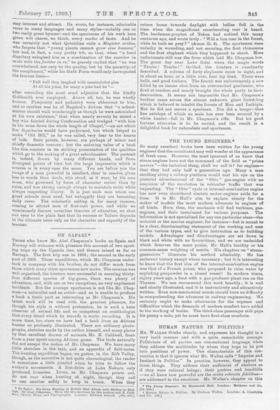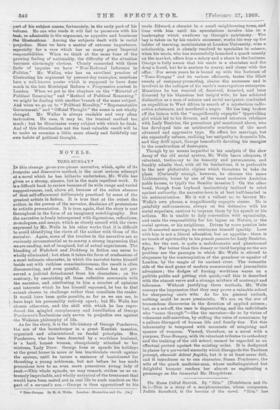HUMAN NATURE IN POLITICat Mn, WALLAS thinks clearly, and expresses
his thought in a very lucid manner and with a quite remarkable courage. Politicians of all parties use conventional language when they address the multitudes by whom they hope to be put into positions of power. One characteristic of this con- vention is that it ignores what Mr. Wallas calls "Impulse and Instinct in Politics." In practice, however, they appeal to these things. They address their audiences of electors as if they were rational beings; their posters and baudbills —we all kuow how powerful are the oculis subiecta fidelibus- are addressed to the emotions. Mr. Wallas's chapter on this
" The Young Bngsneer. By Hammond Hall London: Methuen and Co. [5a. net.]
1 Human Nature in Politics. By Graham Wallas. London: A. Constable and Co. lea.] Part of his subjeot comes, fortunately, in the early part of his volume. No one who reads it will fail to persevere with his Ulla so admirable is the argument, so apposite and luminous the illustrations. Among the subjects dealt with is racial prejudice. Here we have a matter of extreme importance, especially for a race which has so many great Imperial responsibilities. When we think at the same time of the growing feeling of nationality, the difficulty of the situation becomes alarmingly obvious. Closely connected with these facts of impulse we have "Non-Rational Inference in %Politics." Mr. Wallas, who has an excellent practice of illustrating his argument by present-day examples, mentions here a well-known poster which is supposed to have done niuch in the late Municipal Reform v. Progressive contest in London. When we get to the chapters on the "Material of Political Reasoning" and "Method of Political Reasoning" we might be dealing with another branch of the same subject. And when we go on to "Political Morality," " Representatiie Government," and "Official Thought" the scene is not wholly changed. Mr. ,Wallas is always readable and very often Instructive. He uses, it may be, the ironical method too much ; but he illuminates every subject with which he deals. And of this illumination not the least valuable result will be to make us examine a little more closely and faithfully our own habits of political thought.







































 Previous page
Previous page